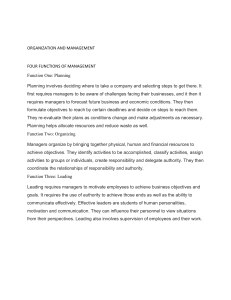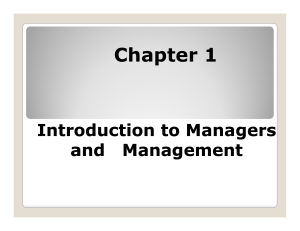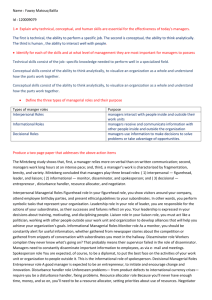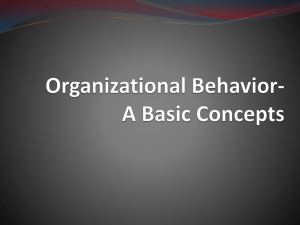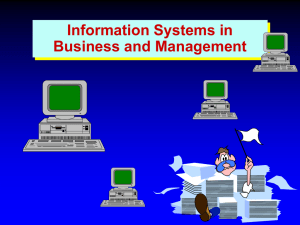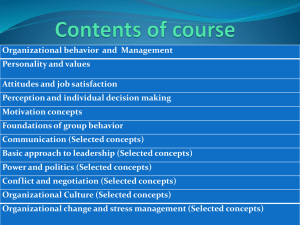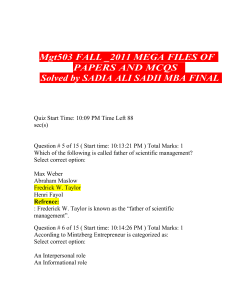Mintzberg
advertisement
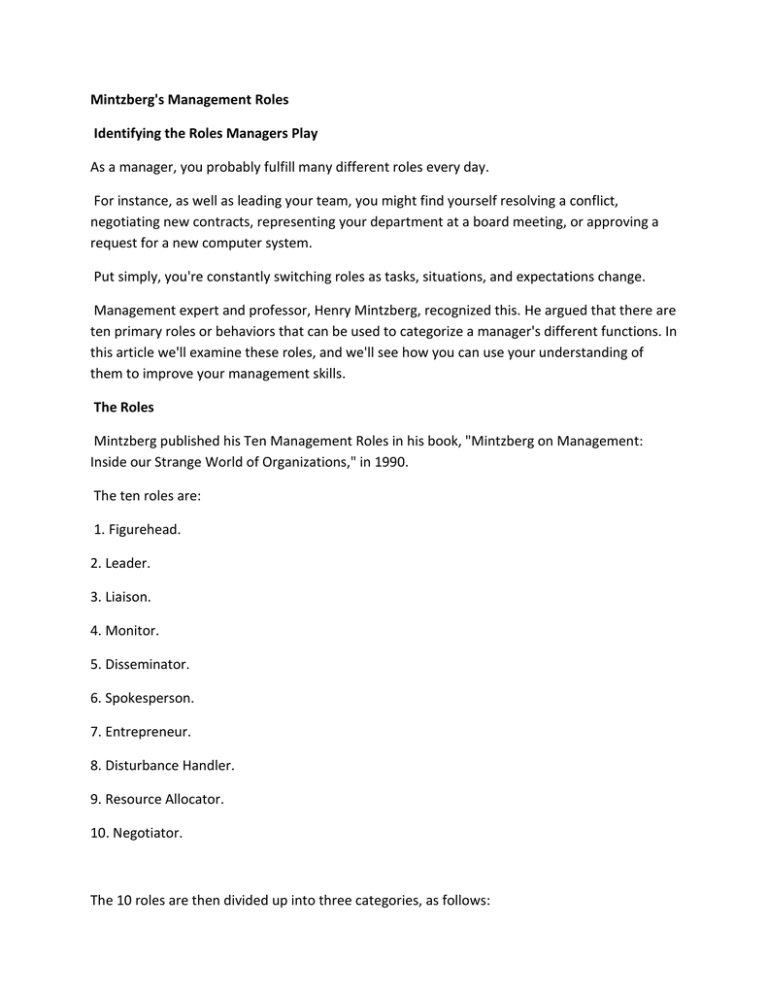
Mintzberg's Management Roles Identifying the Roles Managers Play As a manager, you probably fulfill many different roles every day. For instance, as well as leading your team, you might find yourself resolving a conflict, negotiating new contracts, representing your department at a board meeting, or approving a request for a new computer system. Put simply, you're constantly switching roles as tasks, situations, and expectations change. Management expert and professor, Henry Mintzberg, recognized this. He argued that there are ten primary roles or behaviors that can be used to categorize a manager's different functions. In this article we'll examine these roles, and we'll see how you can use your understanding of them to improve your management skills. The Roles Mintzberg published his Ten Management Roles in his book, "Mintzberg on Management: Inside our Strange World of Organizations," in 1990. The ten roles are: 1. Figurehead. 2. Leader. 3. Liaison. 4. Monitor. 5. Disseminator. 6. Spokesperson. 7. Entrepreneur. 8. Disturbance Handler. 9. Resource Allocator. 10. Negotiator. The 10 roles are then divided up into three categories, as follows: Interpersonal Category The roles in this category involve providing information and ideas. 1. Figurehead - As a manager, you have social, ceremonial and legal responsibilities. You're expected to be a source of inspiration. People look up to you as a person with authority, and as a figurehead. 2. Leader - This is where you provide leadership for your team, your department or perhaps your entire organization; and it's where you manage the performance and responsibilities of everyone in the group. 3. Liaison - Managers must communicate with internal and external contacts. You need to be able to network effectively on behalf of your organization. Informational Category The roles in this category involve processing information. 4. Monitor - In this role, you regularly seek out information related to your organization and industry, looking for relevant changes in the environment. You also monitor your team, in terms of both their productivity, and their well-being. 5. Disseminator - This is where you communicate potentially useful information to your colleagues and your team. 6. Spokesperson - Managers represent and speak for their organization. In this role you're responsible for transmitting information about your organization and its goals to the people outside it. Decisional Category The roles in this category involve using information. 7. Entrepreneur - As a manager, you create and control change within the organization. This means solving problems, generating new ideas, and implementing them. 8. Disturbance Handler - When an organization or team hits an unexpected roadblock, it's the manager who must take charge. You also need to help mediate disputes within it. 9. Resource Allocator - You'll also need to determine where organizational resources are best applied. This involves allocating funding, as well as assigning staff and other organizational resources. 10. Negotiator - You may be needed to take part in, and direct, important negotiations within your team, department, or organization. Applying the Model You can use Mintzberg's 10 Management Roles model as a frame of reference when you're thinking about developing your own skills and knowledge. (This includes developing yourself in areas that you consciously or unconsciously shy away from.) First, examine how much time you currently spend on each role. Do you spend most of your day leading? Managing conflict? Disseminating information? This will help you decide which areas to work on first. Next, get a piece of paper and write out all ten roles. Score yourself from 1-5 on each one, with 1 being "Very skilled" to 5 being "Not skilled at all." Once you've identified your weak areas, use the following resources to start improving your abilities in each role. Figurehead Figureheads represent their teams. If you need to improve or build confidence in this area, start with your image, behavior, and reputation. Cultivate humility and empathy, learn how to set a good example at work, and think about how to be a good role model. Leader This is the role you probably spend most of your time fulfilling. To improve here, start by taking our quiz, How Good Are Your Leadership Skills? This will give you a thorough understanding of your current abilities. Next, learn how to be an authentic leader, so your team will respect you. Also, focus on improving your emotional intelligence - this is an important skill for being an effective leader. Liaison To improve your liaison skills, work on your professional networking techniques. You may also like to take our Bite-Sized Training course on Networking Skills. Monitor To improve here, learn how to gather information effectively and overcome information overload. Also, use effective reading strategies, so that you can process material quickly and thoroughly, and learn how to keep up-to-date with industry news. Disseminator To be a good disseminator you need to know how to share information and outside views effectively, which means that good communication skills are vital. Learn how to share organizational information with Team Briefings. Next, focus on improving your writing skills. You might also want to take our communication skills quiz, to find out where else you can improve. Spokesperson To be effective in this role, make sure that you know how to represent your organization at a conference. You may also want to read our articles on delivering great presentations and working with the media (if applicable to your role). Entrepreneur To improve here, build on your change management skills, and learn what not to do when implementing change in your organization. You'll also need to work on your problem solving and creativity skills, so that you can come up with new ideas, and implement them successfully. Disturbance Handler In this role, you need to excel at conflict resolution and know how to handle team conflict. It's also helpful to be able to manage emotion in your team. Resource Allocator To improve as a resource allocator, learn how to manage a budget, cut costs, and prioritize, so that you can make the best use of your resources. You can also use VRIO Analysis to learn how to get the best results from the resources available to you. Negotiator Improve your negotiation skills by learning about Win-Win Negotiation and Distributive Bargaining. You might also want to read our article on role-playing - this technique can help you prepare for difficult negotiations. http://www.mindtools.com/pages/article/management-roles.htm
